
Margaret Hilda Thatcher, Baroness Thatcher, was a British stateswoman and Conservative politician who served as Prime Minister of the United Kingdom from 1979 to 1990 and Leader of the Conservative Party from 1975 to 1990. She was the longest-serving British prime minister of the 20th century and the first woman to hold the position. As prime minister, she implemented economic policies known as Thatcherism. A Soviet journalist dubbed her the "Iron Lady", a nickname that became associated with her uncompromising politics and leadership style.

Tracey Ullman is a British-American actress, comedian, singer, dancer, screenwriter, producer, and director. Critics have lauded her ability to shift seamlessly in and out of character and accents, with many dubbing her the "female Peter Sellers". Her earliest mainstream appearances were on British television sketch comedy shows A Kick Up the Eighties and Three of a Kind. After a brief singing career, she appeared as Candice Valentine in Girls on Top with Dawn French and Jennifer Saunders.
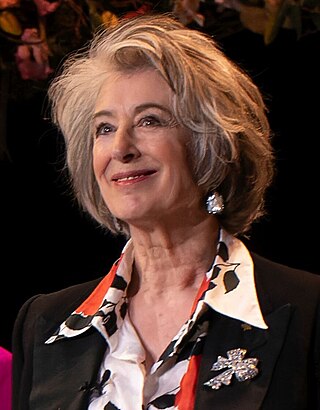
Dame Maureen Diane Lipman is an English actress, columnist and comedian. She trained at the London Academy of Music and Dramatic Art and her stage work has included appearances with the National Theatre and the Royal Shakespeare Company. She was made a dame in the 2020 Queen's Birthday Honours for services to charity, entertainment and the arts.
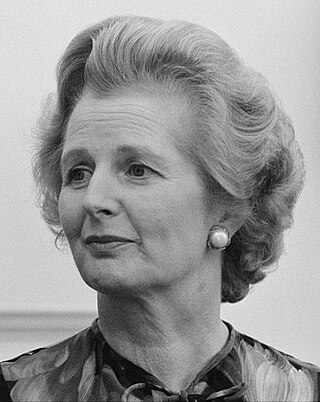
The 1979 United Kingdom general election was held on Thursday 3 May 1979 to elect 635 members to the House of Commons. The election was held following the defeat of the Labour government in a no-confidence motion on 28 March 1979, six months before the Parliament was due for dissolution in October 1979.

Glenda May Jackson was an English actress and politician. Over the course of her distinguished career she received numerous accolades including two Academy Awards, two BAFTA Awards, three Emmy Awards, a Golden Globe Award, and a Tony Award. A member of the Labour Party, she served continuously as a Member of Parliament (MP) for 23 years – for Hampstead and Highgate from 1992 to 2010, and then, following boundary changes, for Hampstead and Kilburn from 2010 to 2015.

Dame Katherine Patricia Routledge is an English actress and singer, best known for her comedy role as Hyacinth Bucket in the popular BBC sitcom Keeping Up Appearances (1990–1995), for which she was nominated for the BAFTA TV Award for Best Light Entertainment Performance in 1992 and 1993.

Christopher Nicholas Parsons was an English actor, straight man and radio and television presenter. He was the long-running presenter of the comedy radio show Just a Minute and hosted the game show Sale of the Century during the 1970s and early 1980s.

Pauline Collins is a British actress who first came to prominence portraying Sarah Moffat in Upstairs, Downstairs (1971–1973) and its spin-off Thomas & Sarah (1979). In 1992, she published her autobiography Letter to Louise.
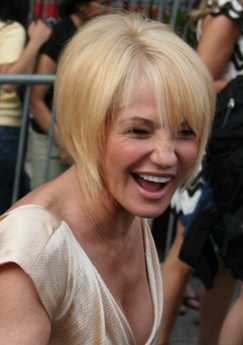
Ellen Rona Barkin is an American actress. Her breakthrough role was in the 1982 film Diner, and in the following years, she had starring roles in films such as Tender Mercies (1983), Eddie and the Cruisers (1983), The Adventures of Buckaroo Banzai Across the 8th Dimension (1984), The Big Easy (1986), Johnny Handsome, and Sea of Love.

Susan Victoria Lucci is an American actress. She is best known for portraying Erica Kane on the ABC daytime drama All My Children during that show's entire network run from 1970 to 2011. The character is considered an icon, and she was called "Daytime's Leading Lady" by TV Guide, with The New York Times and the Los Angeles Times citing her as the highest-paid actor in daytime television. As early as 1991, her salary had been reported as over $1 million a year. During her run on All My Children, Lucci was nominated 21 times for the Daytime Emmy Award for Outstanding Lead Actress in a Drama Series. She won only once, in 1999, after the 19th nomination; her status as a perpetual nominee for the award had attracted significant media attention since the late 1980s.

Lori Petty is an American actress, director, and screenwriter. She made her big screen debut appearing in the 1990 comedy film Cadillac Man and later starred in films Point Break (1991), A League of Their Own (1992), Free Willy (1993), In the Army Now (1994), The Glass Shield (1994) and played the title role in Tank Girl (1995). She created and starred in the short-lived Fox sitcom Lush Life in 1996 and acted in number of independent movies in her later career.

Brenda Blethyn is an English actress. Known for her character work and versatility, she is the recipient of various accolades, including a Golden Globe, a BAFTA, and a Cannes Film Festival Award, as well as nominations for two Academy Awards and two Primetime Emmys. She was appointed Officer of the Order of the British Empire (OBE) for services to drama in 2003.
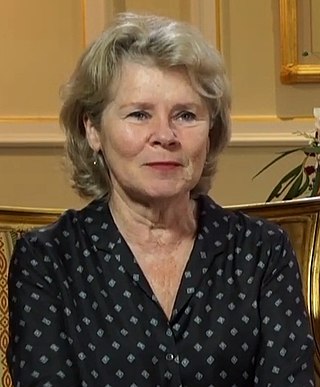
Dame Imelda Mary Philomena Bernadette Staunton is an English actress and singer. After training at the Royal Academy of Dramatic Art, Staunton began her career in repertory theatre in 1976 and appeared in various theatre productions in the United Kingdom. Over her career, she has received several awards including a British Academy Film Award, and four Laurence Olivier Awards as well as nominations for an Academy Award, three British Academy Television Awards, three Golden Globe Awards, and three Emmy Awards.
Amanda Donohoe is an English actress. She first came to public attention at age 16 for her relationship with pop singer Adam Ant, appearing in the music videos for the Adam and the Ants singles "Antmusic" (1980) and "Stand and Deliver" (1981) during their four-year relationship. After making her film debut in Foreign Body (1986), she co-starred in Castaway with Oliver Reed and starred in two films by Ken Russell: The Lair of the White Worm (1988) and The Rainbow (1989).

Sylvia May Laura Syms was an English stage and screen actress. Her best-known film roles include My Teenage Daughter (1956), Woman in a Dressing Gown (1957), for which she was nominated for a BAFTA Award, Ice Cold in Alex (1958), No Trees in the Street (1959), Victim (1961) and The Tamarind Seed (1974).
Olga Sosnovska is a Polish actress known for her work on television shows such as Spooks and All My Children. She was born in Poland and is based in the United States and the United Kingdom.
Sue Johnston is an English actress. She is known for portraying Sheila Grant in the Channel 4 soap opera Brookside (1982–1990), Barbara Royle in the BBC comedy The Royle Family (1998–2012), Grace Foley in the BBC drama Waking the Dead (2000–2011), Gloria Price in the ITV soap opera Coronation Street (2012–2014) and Miss Denker in the ITV drama Downton Abbey (2014–2015). She won the 2000 British Comedy Award for Best TV Comedy Actress and was nominated for the 2000 BAFTA TV Award for Best Comedy Performance for The Royle Family.

Frances Barber is an English actress. She received Olivier Award nominations for her work in the plays Camille (1985), and Uncle Vanya (1997). Her film appearances include three collaborations with Gary Oldman in Prick Up Your Ears (1987), We Think the World of You (1988) and Dead Fish (2005); as well as Sammy and Rosie Get Laid (1987); Soft Top Hard Shoulder (1992); and latterly Film Stars Don't Die in Liverpool (2017). Barber's numerous television credits include The Street (2009), Doctor Who (2011), Silk (2012–2014), and Whitstable Pearl (2021–2022).

Alison Steadman is an English actress. She received the 1977 Evening Standard Theatre Award for Best Actress for Abigail's Party, the 1991 National Society of Film Critics Award for Best Actress for the Mike Leigh film Life Is Sweet and the 1993 Olivier Award for Best Actress for her role as Mari in the original production of The Rise and Fall of Little Voice. In a 2007 Channel 4 poll, the '50 Greatest Actors' voted for by other actors, she was ranked 42.
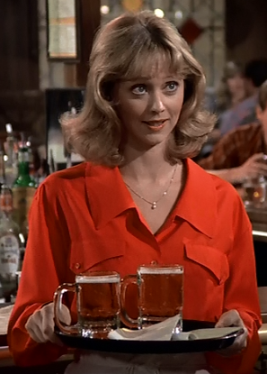
Diane Chambers is a fictional character in the American television situation comedy show Cheers, portrayed by Shelley Long and created by Glen and Les Charles. She is one of two main protagonists in the first five seasons of the series. After her fiancé Sumner Sloan abandons her in the Cheers bar in the pilot episode, Diane works as a bar waitress. She has an on-off relationship with the womanizing bartender Sam Malone and a one-year relationship with Frasier Crane, who later becomes a main character of the series and its spin-off Frasier. When Long left the series during the fifth season, the producers wrote her character out. After that, they added her permanent replacement Rebecca Howe, a businesswoman played by Kirstie Alley, in the sixth season. Shelley Long made a special guest appearance as Diane in the series finale, as well as in Frasier as a one-time figment of Frasier's imagination, and as the actual Diane in the crossover episode "The Show Where Diane Comes Back".
















